
Majority in U.S. Now Say Gays and Lesbians Born, Not Made
Story Highlights
- 51% of Americans say people are born gay or lesbian
- 30% say upbringing, environment determine sexual orientation
- New high of 63% say gay relations morally acceptable
PRINCETON, N.J. -- For the first time, a majority of Americans say same-sex orientation is something gays and lesbians are born with rather than something that is determined by their upbringing or environment. Over the past 15 years, Americans had been much more closely divided on the issue. And in the 1970s and 1980s, majorities attributed same-sex orientation to environmental factors rather than innate characteristics.
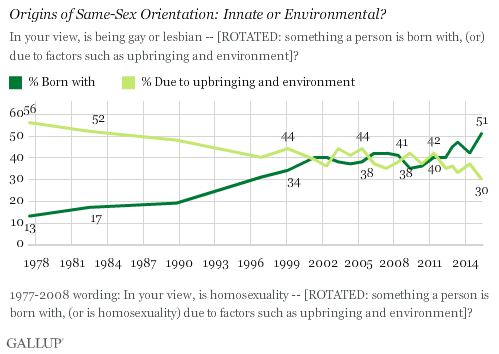
The current results are based on a May 6-10 Gallup poll that updates several long-standing trend questions on gay and lesbian rights. The poll also finds a new high in support for same-sex marriage.
The question of whether people with same-sex orientation are born that way has been a recent issue in the presidential campaign. Republican candidate Dr. Ben Carson set off a minor controversy when he suggested people "absolutely" choose to be gay or lesbian, citing same-sex activity among prisoners as evidence. He later apologized for those comments. Another Republican candidate, Marco Rubio, addressed the issue directly, saying that while he does not support same-sex marriage, he does believe people are born gay or lesbian.
Neither viewpoint is out of step with the views of GOP supporters, as Republicans, including Republican-leaning independents, are evenly divided on whether Americans are born gay or lesbian (40%) or whether same-sex orientation is determined by environmental factors (36%). However, even that is a dramatic shift for Republicans, as it represents the first time they have not attributed being gay or lesbian to environmental factors by at least a small margin.
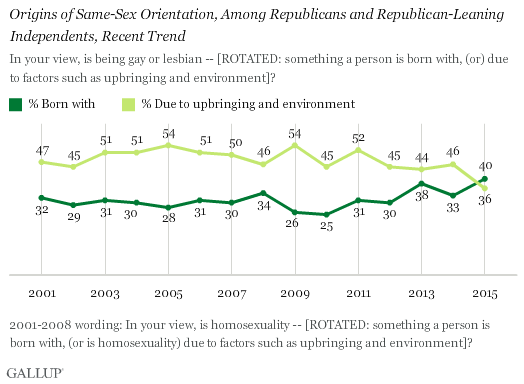
Democrats' views have also evolved, although the transformation took place further in the past. In 2001, Democrats and Democratic leaners were divided on the origins of same-sex orientation, but since then have shown a clear tendency to believe that it is an innate characteristic, with 62% holding that view this year.
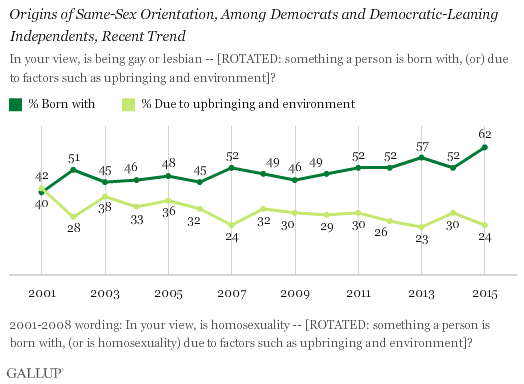
New High Describe Same-Sex Relations as "Morally Acceptable"
In addition to their changing views on the origins of being gay or lesbian, Americans' views on the morality of same-sex relations have also shifted in recent years. Currently, a record-high 63% of Americans describe gay or lesbian relations as "morally acceptable." That became the majority view in 2010. Only a decade ago, a majority thought same-sex relations were morally wrong.
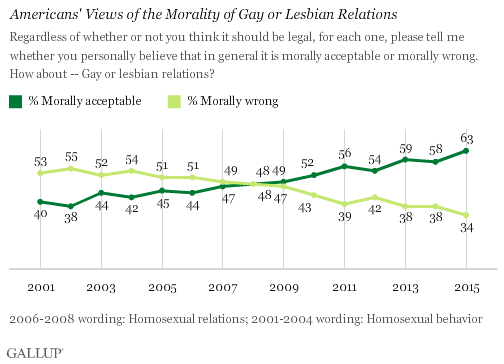
Since 2001, increasing percentages of both Republicans and Democrats say gay or lesbian relations are morally acceptable, though Democrats continue to be much more likely to express that view. Notably, for the first time, a majority of Republicans believe that same-sex relations are morally acceptable. Democrats crossed the majority threshold more than a decade ago.
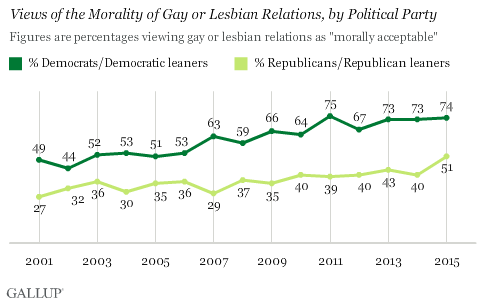
Implications
Across a number of different measures, Americans are clearly becoming more accepting of gays and lesbians, both in terms of viewing same-sex relations as morally acceptable and supporting legal same-sex marriage. And this year for the first time, a majority of Americans say they believe that being gay or lesbian is something people are born with, rather than a product of their environment.
These trends are evident among Republicans as well as Democrats, although Democrats continue to be much more accepting than Republicans. Still, this year may mark a key milestone in Republicans' views on same-sex relations. A majority of Republicans now describe same-sex relations as morally acceptable and they are now equally likely to view same-sex orientation as an inherent characteristic rather than a choice or a consequence of how people were raised.
The recent trends toward Americans' increasing acceptance of gays and lesbians still show no sign of leveling off, and should continue to rise in the future, given that younger Americans are much more likely than older Americans to express positive views of same-sex relations.
Survey Methods
Results for this Gallup poll are based on telephone interviews conducted May 6-10, 2015, with a random sample of 1,024 adults, aged 18 and older, living in all 50 U.S. states and the District of Columbia. For results based on the total sample of national adults, the margin of sampling error is ±4 percentage points at the 95% confidence level.
Each sample of national adults includes a minimum quota of 50% cellphone respondents and 50% landline respondents, with additional minimum quotas by time zone within region. Landline and cellular telephone numbers are selected using random-digit-dial methods.
View survey methodology, complete question responses, and trends.
Learn more about how Gallup Poll Social Series works.
